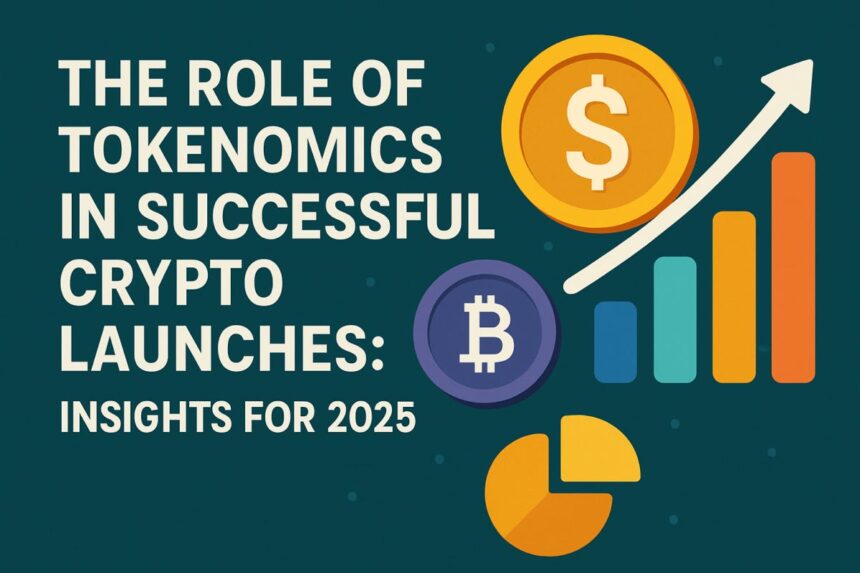The world of cryptocurrency continues to expand at an impressive rate, with businesses and entrepreneurs increasingly exploring opportunities within the blockchain space. For any organization aiming to launch a successful crypto project in 2025, one factor consistently stands out: tokenomics. Understanding and strategically planning tokenomics can make the difference between a project that thrives and one that quickly fades.
As demand grows for crypto solutions, finding a reliable Token development company becomes pivotal. These companies help craft digital tokens suited for a wide range of applications, including payment solutions, governance, rewards, and investment opportunities. Quality development is just one part; how those tokens are structured — their tokenomics — plays a foundational role in both immediate uptake and long-term sustainability.
Tokenomics refers to the economic structure behind a given token. It involves the rules, incentives, and behaviors that drive the token’s value, utility, and circulation. Crucial areas of tokenomics include:
- Token supply
- Distribution mechanisms
- Utility and use cases
- Incentive models for stakeholders
- Governance frameworks
- Mechanisms to address inflation and deflation
When designed correctly, tokenomics fosters trust, encourages participation, and forms the backbone for project growth and community engagement.
Token Supply
Token supply decisions — such as implementing a fixed or inflationary supply — directly influence scarcity, perceived value, and investor appeal. Popular models include:
- Fixed Supply: A predetermined, unchangeable total supply. This format can produce scarcity-driven value, similar to Bitcoin.
- Deflationary Models: Involve periodically “burning” tokens to reduce supply, increasing scarcity.
- Inflationary Models: New tokens are continually created to incentivize participation or reward miners/validators. This model requires careful control to avoid devaluation.
Token Distribution Strategy
Distribution methods, such as initial coin offerings (ICOs), airdrops, dividend distributions, or rewards for ecosystem participation, directly affect market dynamics and initial liquidity. Fair and transparent distribution keeps communities motivated and reduces the potential for manipulation.
Utility and Use Cases
Tokens must serve clear purposes. Common use cases include payment within a blockchain network, participation in governance, yielding rewards, or providing access to special features. The broader and more practical the use cases, the stronger and more resilient the ecosystem becomes.
Incentive Structures
Incentive mechanisms reward participants for actions like staking, validating transactions, or contributing development. Effective structures keep a network active and its participants engaged.
Governance
Governance protocols define how future decisions are made. Decentralized Autonomous Organizations (DAOs), token-based voting, and on-chain proposals are becoming industry standards for governance in 2025. Community-driven decision-making helps build trust and encourages long-term support.
Attracting Early Participation
Strong tokenomics attract investors and users in the early stages. Details about supply, reward distribution, and intended use create tangible value propositions that instill confidence in stakeholders.
Promoting Long-Term Value
Tokenomics is not just about the initial launch hype. It supports long-term viability by embedding incentives for user retention and adoption, preventing rapid sell-offs or pump-and-dump scenarios.
Mitigating Risks and Volatility
Carefully crafted tokenomics restrict large sales by early backers, limit manipulation, and provide stability — even during high-volume trading periods.
Enabling Community Growth
Communities emerge and grow when they believe in the underlying value and governance of a project. Tokenomics design can include voting rights and staking mechanisms, empowering the community to guide the project’s future.
Shift Toward Real-World Utility
The most successful projects in 2025 focus on real-world use cases, such as tokenizing loyalty programs, asset-backed tokens, and utility tokens with clear business integrations.
Regulatory Compliance
Projects are now designed for better regulatory compatibility, with tokenomics built to meet requirements for anti-money laundering (AML), know-your-customer (KYC), and securities laws.
Multi-Chain and Interoperability Support
Tokens with cross-chain capabilities and interoperability features support broader adoption by operating on multiple networks.
Sustainable Economic Models
There is a notable shift towards sustainability in tokenomics, emphasizing mechanisms that support continuous growth, reinvestment into the ecosystem, and avoidance of economic pitfalls like inflation spikes or liquidity crunches.
- Define Clear Objectives
- Identify the core mission and the target audience.
2. Determine the Token’s Utility
- List out all the use cases for the token within your ecosystem.
3. Choose a Supply Model
- Decide between fixed, inflationary, or deflationary supply models.
4. Design Distribution Plans
- Assess ICO, private sales, or airdrops for dispersing tokens.
5. Build Incentive Programs
- Structure rewards that sustain community growth and engagement.
6. Implement a Governance System
- Choose on-chain/off-chain mechanisms to ensure transparency and fairness.
7. Enforce Compliance Measures
- Proactively integrate regulatory and reporting requirements.
Each project tailors its tokenomics to maximize utility, participation, and community trust, setting standards the industry follows.
- Overly Complex Structures: Can confuse users and discourage engagement.
- Poor Distribution Planning: Over-concentration among founders/investors can reduce community trust.
- Lack of Use Cases: Tokens with no clear function typically lose value and interest quickly.
- Ignoring Regulatory Factors: Can expose projects to shut-downs, fines, or legal risks.
- Inflation Mismanagement: Uncontrolled token creation can rapidly diminish token value.
Professional token development companies draw upon a deep understanding of tokenomics to guide clients from token conception to post-launch management. Their typical roles include:
- Advising on token models best suited for business goals.
- Structuring distribution to attract users, encourage participation, and foster liquidity.
- Integrating compliance processes right from the start.
- Developing custom smart contracts that reflect the designed tokenomics model.
- Supporting post-launch governance and technical updates.
With professional guidance, businesses can gain a clear roadmap, reduce market entry barriers, and avoid overlooked pitfalls.
- Transparency: Open documentation of tokenomics, supply, and distribution, easily accessible to all stakeholders.
- Simplicity: Clear descriptions and straightforward models.
- Continuous Feedback: Iterative improvement based on community and market response.
- Robust Security: Thorough audits of smart contracts to prevent vulnerabilities and maintain trust.
- Sustainability: Economic models that support long-term utility, engagement, and value growth.
- Regulatory Preparedness: Design for compliance with current and anticipated crypto regulations.
Looking ahead, tokenomics will increasingly mirror traditional economic systems, with emphasis on real-world value, user engagement, and regulatory acceptance. Businesses planning a crypto project for 2025 and beyond should prioritize:
- Economic incentives aligned with business goals.
- Transparent and fair distribution to build trust.
- Technical flexibility to adopt new features or respond to regulatory changes.
- Pragmatic utility and integration within business processes.
Choosing a trusted Token development company is essential. Prioritize those with:
- Proven track records in delivering successful token launches.
- Deep knowledge in both technical and economic aspects of token creation.
- Adept understanding of compliance and international regulatory environments.
- Focused support for ongoing governance and post-launch services.
Ready to launch your crypto project with robust and future-ready tokenomics? codezeros offers token development services designed for businesses like yours. From concept to execution, our experienced team helps develop tokens that inspire trust, facilitate engagement, and support real growth in 2025.
Take the next step. Connect with codezeros today to begin your journey in token development, setting the stage for a new era of digital innovation.
For more information, contact our Token Development experts at codezeros.
Before you go:










